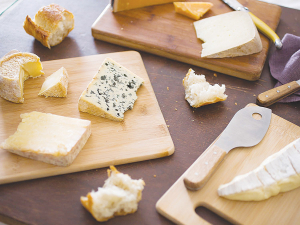Dairy prices defy ample supply as market momentum builds
Global dairy prices continue to rise despite ample supply from key milk producing countries including New Zealand.
 Since late 2021, global cheese prices have averaged 32% higher than the five-year average prior - between November 2016 and October 2021.
Since late 2021, global cheese prices have averaged 32% higher than the five-year average prior - between November 2016 and October 2021.
The first Global Dairy Trade (GDT) auction for the new season delivered underwhelming results last week.
Whole milk powder prices slumped 3% to US$3,173/metric tonne while milk fats managed modest gains.
ASB economist Nat Keall notes that dairy prices have largely drifted over recent auctions, struggling to maintain clear direction.
Keall says the WMP contract curve at the last auction appeared to show momentum, with buyers paying a premium for product stretching into the middle of the season.
But that has largely dissipated, with prices flatlining in a US$3,150-$3,200/MT range this auction.
Keall says the most notable feature of last week's auction was China's continued absence from the market. The North Asia group took only around 34% of the WMP on offer this auction, equivalent to the sort of proportion it was buying during its zero-Covid period last year.
"Looking over the last handful of auctions - and six months on from the ending of those restrictions - China's return to the global dairy market has been modest and uneven.
"This isn't hugely surprising. Local WMP production remains strong, while domestic consumption remains comparatively subdued. Recent Chinese economic data has printed below expectations too, undermining the notion that a strong domestic recovery will put a rocket under dairy auction prices anytime soon."
ASB has retained its $7.25/kgMS farmgate milk price forecast for the season.
Keall says the prevailing global dairy market dynamics don't look hugely supportive for prices.
"As we've said for some time, global dairy supply looks to be past the lows of recent years at the same moment that global growth is slowing, crimping consumption."
If there's a silver lining for farmers, it's that the NZ dollar continues to underperform.
"Indeed, this was the catalyst for our decision to add 25c to our milk price forecast last week.
"The Kiwi continues to trade in a lower band in the aftermath of the RBNZ's surprise dovish turn a fortnight ago. Relative interest rates look to have peaked in NZ's favour and have shifted towards the US. If the NZ dollar heads lower, earlier than we expect, that could yet push our forecast a little higher still."
Meanwhile cheese prices continue to soar. Last week's GDT saw cheddar prixed rise 7.4% to US$4,668/metric tonne.
Westpac senior agri economist Nathan Penny says the world now definitely loves cheese.
"Indeed, reflecting this global love affair, since late 2021, global cheese prices have averaged 32% higher than the five-year average prior - between November 2016 and October 2021.
"Pinning down the exact genesis for the cheesy trend is a question for the marketing experts, however, we suspect it has something to do with Covid lockdowns, the ease of pizza deliveries during said lockdowns, and therefore a new-found love of cheese in the large fast-growing markets in Asia."
However, New Zealand is not relatively well-placed to benefit from high cheese prices.
"While increasing global consumption of dairy products is normally a good thing for New Zealand, we are not well-placed to benefit from higher cheese prices, at least in the short-term," says Penny.
"New Zealand dairy companies have limited (factory) capacity to produce more cheese. And while cheese production has expanded where possible, in the short term, these companies are stuck producing other less profitable products like whole milk powder."
Coming in at a year-end total at 3088 units, a rise of around 10% over the 2806 total for 2024, the signs are that the New Zealand farm machinery industry is turning the corner after a difficult couple of years.
New Zealand's animal health industry has a new tool addressing a long-standing sustainability issue.
The Government has announced that ACC will be a sponsor of this year's FMG Young Farmer of the Year competition.
As veterinary student numbers grow to help address New Zealand's national workforce shortge, Massey University's School of Veterinary Science is inviting more veterinary practices to partner in training the next generation of vets.
South Island dairy farmers will soon be able to supply organic milk to Fonterra.
Norwood has announced the opening of a new Tasman dealership at Richmond near Nelson next month.
OPINION: There will be no cows at Europe's largest agricultural show in Paris this year for the first time ever…
OPINION: Canterbury grows most of the country's wheat, barley and oat crops. But persistently low wheat prices, coupled with a…